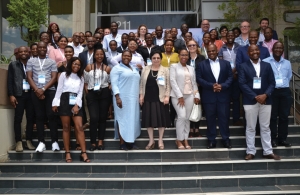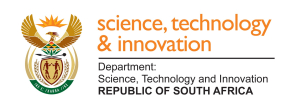SAASTA’s first Nanotechnology Symposium on Health, Safety and Environment
The South African Agency for Science and Technology Advancement (SAASTA) and the Nanotechnology Public Engagement Programme (NPEP), in-collaboration with the Department of Science and Innovation (DSI) held the first Nanotechnology Symposium on Health, Safety and Environment on Monday 10 February 2020. The event took place at the SAASTA auditorium, Pretoria in Gauteng.
The Nanotechnology symposium was a wealth of discussion and innovative research on Nanotechnology in South Africa. It brought together scientists, policy makers, researchers, science communicators and stakeholders from both the private and public sector. The symposium aimed at providing a platform to discuss the Health, Safety and Environment of Nanotechnology, which could lead to a sustainable development of Nanotechnology in South Africa.
Opening the symposium was Dr Jabu Nukeri, the Managing Director at SAASTA. Dr Nukeri spoke about the importance of Nanotechnology in South Africa. He mentioned how impactful is the use of nanotechnology on addressing the country’s challenges.
Nukeri spoke about the need to continue the development of Nanotechnology, as now it is critical to keep up momentum for all the progress that has been made. He further spoke about how important such discussions are, but there is a need for action on such interactions and be taken to the communities.
Dr Xolani Makhoba, a representative of the DSI gave a talk detailing the progress of the Department of Science and Innovation’s (DSI) National Nanotechnology Strategy. The strategy was approved in 2005 to ensure that South Africa becomes a player in the emerging area of science and technology. It is an important landmark in South Africa’s goal to use nanotechnology to address a wide range of social and economic challenges in South Africa.
Dr Makhoba stated that the strategy’s focus areas are manufacturing, water, health and energy. The investment in Nanotechnology has yielded relevant local and international competitive outputs. According to a study conducted by the Greenhouse consultants on behalf of the DSI, this research has shown that the Nanotechnology strategy has achieved the following; 400 PhD graduates, 400 Masters graduates, 5000 publications on Nanotechnology and 40 patents registrations.
Continuing the topic of Governments efforts of developing Nanotechnology in the country was Ms Nontombi Marule from the Department of Trade and Industry (DTI), who presented on the innovation and commercial support of Nanotechnology. According to Ms Marule, technology commercialisation is critical in supporting industrialisation and diversifying the South African economy through the creation of new industries. She encouraged commercialisation of innovations because it will have impact on the societal and economic needs of communities.
During the symposium, delegates discussed how the HSE policy and regulatory environment is conducive for the sustainable development of nanotechnology and the role of the Nano code of conduct. This is crucial to ensure that South Africa is able to grow the Nanotechnology industry and to create opportunities for human capital development, particularly for historically disadvantaged communities and women.
In addition, delegates had a broad discussion about the way forward. It was concluded that in a short period of time, the objective to use nanotechnology to address the country’s challenges in the areas of water, health and energy, as well as to give a competitive edge to some of the country’s strategic industries (mining and minerals, advanced materials and manufacturing, and chemicals and bioprocessing) are being realised. Spearheading the creation of programmes focusing on human capital development and on growing the nanoscience and nanotechnology research base.
Furthermore, they emphasized the need to maintain funding and to continue the development of Nanotechnology in order to build on the progress that has been made. Much of which, progress is ongoing at the NRF-SAASTA.


 The South Africa Agency for Science and Technology Advancement (SAASTA) is a business unit of the
The South Africa Agency for Science and Technology Advancement (SAASTA) is a business unit of the 
